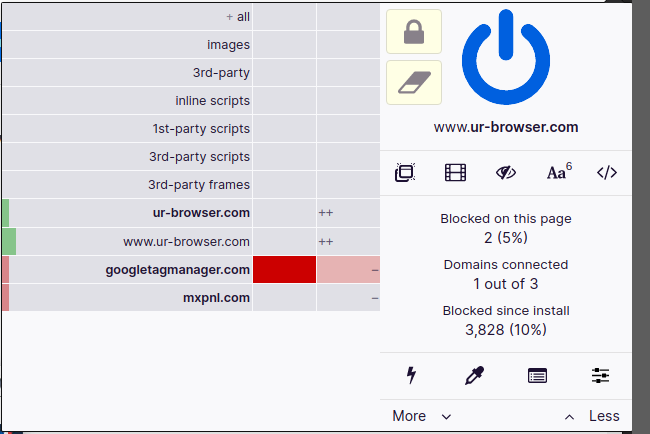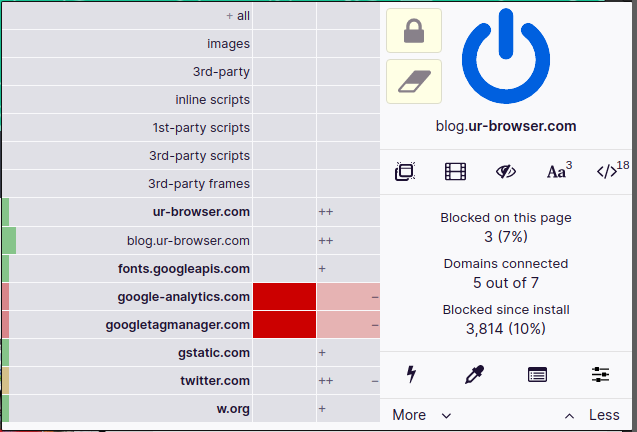What is the best browser to use as a second?
-
The other two active engines would be Safari/Webkit (though I'm not certain Apple has a Windows version any more) and the parent of both Chromium and Safari - Konqueror/khtml. I seem to recall mention of KDE apps for Windows, but can't find it.
-
Years ago, there were a couple of distros that used Opera Presto due to either its small size or low resource usage, though not now ...
-
I certainly would not recommend srware iron browser as an alternative as it is purely a scamware creating non existent issues with chromium/chrome and then claiming iron solves them.
Problem with iron is that it blocks "everything" including CRLset updates and other components.
If you are using a chromium based browser as a second then expect it to connect to google servers as they need to for security reasons.There seems to be this myth that if you use another chromium based browser that you are evading google..never going to happen.
i am only a very recent user of vivaldi so vivaldi is my 2nd browser if you wish as i have used pale moon for many years but 32bit linux pale moon will end in december and vivaldi will be the successor and im liking it so far.
-
I currently have the Min Browser on my test run. It can serve as an occasional emergency browser, it is FOSS, it has good privacy protection, although, nomen est omen, it is a browser in its simplest expresion, a window with a configurable search engine (Startpage, DDG) and that's it.
https://github.com/minbrowser/min
https://minbrowser.org/ -
@Catweazle You can try qutebrowser, as @potmeklecbohdan suggested. Interesting, maybe a little bit experimental yet.
-
@hlehyaric , I've already tried it, but I'm a Mous driven user. Qute is not bad, but I do not like its handling so much.
-
@Catweazle said in What is the best browser to use as a second?:
suggestions?
Firefox-Nightly, with assiduousabout:configtweaks, plus some excellent AOs.Opera12gets reinstalled each time i hop distros, & i fire it up now & then. I probably will remove it soon, coz it's too upsetting to see the myriad websites i commonly use that it won't load at all now, let alone run properly. We all here already know this, of course, & have done so for years, but it's hard letting go.@mib2berlin said in What is the best browser to use as a second?:
Falkon ... looks really basic
Oh indeed it is, & fails at some important basic tasks. My main use of it is simply to fire it up so i can idly do some time-killing surfing whilst everything else is closed down during my weekly backups. Once the b/u are over i can close Falkon again til next time then relaunch a proper browser. That said, I really do like its TreeStyleTab-esque sidebar -- V really needs to get onto TST.
@Priest72 said in What is the best browser to use as a second?:
pale moon
I had this on Manjaro & each distro before that. When i changed to current distro Arch, i chose to leave PM alone [not install]. It's precompiled & part of the standard Manjaro repos, so it's dead-simple to install, but in Arch they kicked it out of their repos months ago hence it needs local building via AUR, but that is resource & time heavy, & has to repeat too often given PM updates, so i abandoned it.
-
Chromium
-
@phanex good answer
-
I usually use Vivaldi as my secondary browser (although depending on my mood, it spends periods as my primary). My other browser is Firefox (or GNU Icecat).
You can get unofficial builds of GNU Icecat compiled for Windows (a package is available in Chocolatey). It's based on Firefox ESR. You can install it manually from the person's web page/repository, or use Chocolatey, in which case you get nice auto-updates.
If you use Firefox or Icecat, there are a number of about:config tweaks you can make, as you see fit, to improve privacy and/or security, for instance first party isolation, disabling telemetry, anti-fingerprinting measures.
Plus, Firefox is the only browser that's probably even more customisable than Vivaldi (although for Firefox, this requires extensions, whereas most of the customisations for Vivaldi can be done with the browser itself).
I like to have two different rendering-engines (e.g. Gecko/Quantum and Webkit/Blink), because any site that's broken in one will probably render in the other. For this reason I see no reason to use Vivaldi alongside Chrome/Opera/Brave/Chromium as the latter is redundant.
Thoughts on Some Other browsers:
I really want to like Otter, and have a copy installed as a nostalgic toy, but it doesn't work as a main browser because the development team just doesn't have the resources. I notice it often completely locks-up on certain web pages (the Vivaldi forum included), and only one developer usually commits any changes to the source, meaning security flaws could remain unpatched for a while and updates may be infrequent/slow.
I stopped using Opera when they dropped the Presto engine, as it lost all its best features and appeal. I was very glad I did, when I found out it had been taken over by a Chinese consortium which appears to include companies with a somewhat controversial and colourful history (Qihoo 360). Whilst there is no evidence of any wrongdoing recently, their history still makes me nervous.
I don't like most Chromium-based browsers because they don't (or didn't, last time I tried) properly check for https certificate revocation. They sacrifice security for an imperceptible speed-increase. Fortunately Vivaldi does the checks properly. You can test this for yourself by attempting to visit a website with a known revoked https certificate, such as revoked.grc.com (note: at the time of writing, the certificate is currently out-of-date. Until they update their certificate, all browsers, even Chrome, should tell you it's expired). If the site displays correctly, then your browser isn't as secure as it should be.
I particularly don't use Chrome because of many anti-features. For instance, there's the telemetry/spying, and signing into Chrome when you sign into a Google service, which is annoying if you share or borrow a computer. Also, it seems to overstep its scope and do some sort of scan of your files, possibly looking for malware but who knows. If it were a genuine feature just to remove malware, I'd have expected Google to be shouting it from the rooftops as a unique selling-point, but instead they secretly and quietly pushed it out to users. Even if it's a genuine feature, the lack of user-control or transparency leaves a bitter taste. I have my own favoured antimalware solutions, and I decide myself when I scan my files.
I agree with others who are wary of SRWare Iron. I remember the original forum discussions where it was announced, and some of the things the author said undermined his credibility a bit. Iron might be great, and it might be better than Chrome, but those initial forum posts made me skeptical, so I won't bother finding out.
-
@jamesbeardmore said in What is the best browser to use as a second?:
Vivaldi alongside Chrome/Opera/Brave/Chromium as the latter is redundant
not. opera has vpn (needed for telegram) and chrome has good support for its own apps (offline docs and stuff). chrome and edge have site translations. They have media player management too. plus sometimes u r required to test on other chromium based browsers if u found some wierd bug in vivaldi.
-
Opera 12.18
- Built-in email client
- Edit source code with the program of your choice (I just use Notepad)
- Open links (usually from email) in other browsers.
- Launch rarely used applications with mnemonic shortcuts, like apng to launch APNG Assembler, without hunting for them in Windows Apps or elsewhere.
-
Don't forget seamonkey is still a very good browser.
One of the reasons i like pale moon is because the developer.(Moonchild) can be contacted directly via the forum.I must confess i have used pale moon for a very long time and sadly after december this year i may have to say au revoir as the linux32bit builds will be discontinued and thus vivaldi will be the successor.
-
I am using PaleMoon as as an alternate browser. Fewer extensionsavailable, but uBlock, PrivacyBadger, and a few others are supported and they have their own extension store.
They have recently been putting out updates.
It is stable.
SeaMonkey also a good alternate but has not had an update in many months.
Midori, I like it but not stable.
Otter, I tried a while back, was not stable at that time. -
I'm back to the UR browser again, none of the other non-chromiums could convince me
-
What do you think of beaker browser (https://beakerbrowser.com) and Vieb browser (https://vieb.dev). This last one is based on vim so it is a modal browser, just like qutebrowser. I've read that you like more mouse based browsers but I think it is worth mentioning. On the other hand beaker browser tries to establish a peer-to-peer internet. It is a good alternative browser.
-
This post is deleted! -
I agree one hundred per cent- for and against- with what you say about UR. I'd also add that there seems to be no obvious means in place for it to update.
-
@J1984 , I've been using UR for a long time and I'm pretty happy with it. It is true that there is no direct evidence on which version of Chromium is based, but it appears that updates are made on a regular basis. It only lacks a support forum, but technical assistance in case of need.
@Gwen-Dragon, it is true that Vivaldi fails on some few sites (videos) but they are point exceptions and for this rare cases I use then UR.
For me it is not a reason not to use Vivaldi as the main browser (Chrome itself had similar problems with some videos in the past) -
Sorry, but too much analytics on the homepage for "a browser that protects your privacy"!


